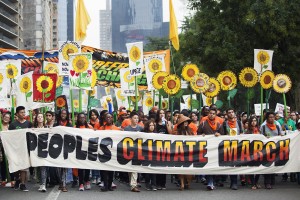
The effects of climate change are soon to hit home in Boston, prompting the local division of the Urban Land Institute to prepare for rising sea levels in Boston and to form creative solutions to keep areas of the city protected from flooding, according to a ULI report released Tuesday.
The sea level could rise up to six feet by 2100, meaning an excess of water could reach Back Bay before the end of the century unless proper preventative and protective measures are taken, the report stated.
“The realities of climate change and associated sea level rise and natural hazards have become increasingly clear,” said Brian Swett, Boston’s chief of environment, energy and open space, in the report. “The city and private sector need to make sure that our current and future buildings and infrastructure are prepared.”
Boston was ranked the “eighth most vulnerable city in the world in terms of overall cost of damage,” the report stated. It also projected Boston’s cost to combat climate change running a tab of more than $1 trillion by 2020.
“In February of 2013, it [the City] launched the Climate Ready Boston initiative, which built on the work of The Boston Harbor Association, and they have been doing a very deep dive on vulnerability of the city,” said report contributor Dennis Carlberg, director of Sustainability@BU.
With the effects of climate change on the horizon, Bostonians can expect to see more days over 90 degrees, more frequent storms, higher winds and issues with resource availability, Carlberg said.
“To prevent the climate change, we all need to reduce the amount of energy we use,” he said. “It gets to the core of our whole sustainability effort, [which is] reducing energy consumption. If we reduce energy consumption, we reduce our green house gas emissions, and that reduces the problem we have to deal with a hundred years from now.”
The report offers solutions to climate change such as development of new public policy, the addition of planted or porous surfaces to absorb an influx of water and an urban system of canals.
The ULI report also outlines an “incremental, phased approach” of changing Back Bay’s infrastructure, which, in the midst of changes in the sea level, poses challenges and risks to public health.
Along with the flooding, Boston residents may experience other effects of climate change such as storm-based destruction caused by extreme waves, damaging the Boston area both physically and financially, said Adrien Finzi, College of Arts and Sciences professor of biology.
“Boston is obviously not the only city being affected by this global change,” he said. “There are two pieces to it. One is sea levels rise because of direct water inputs from melting ice and glaciers. The second bit is that, as you increase the temperature of water, its density decreases, so the volume gets larger.”
Several residents said the threats of climate change are concerning, and they hope the City begins to take preventative measures to combat the issue.
Chantae Powell, 24, of Roxbury, said residents need to stay updated on climate change issues and begin to consider what preventative measures should be taken.
“You probably never think water’s going to reach that high of a level, so it’s shocking,” she said. “I don’t even know what they could do to prevent it. You could build a wall, but if the water grows higher, it could overcome the wall. What could you really do about it?”
Bri Cervantes, 20, of Allston, said climate change could be slowed if the fossil fuel industry lessens its influence on energy consumption.
“Climate change is happening, and we can’t stop it. We’re at the point of no return,” she said. “It would be great if everyone was environmentally minded and took precautions…things that normal people do to not consume so much energy with fossil fuels, not produce so much waste, to just be environmentally minded.”